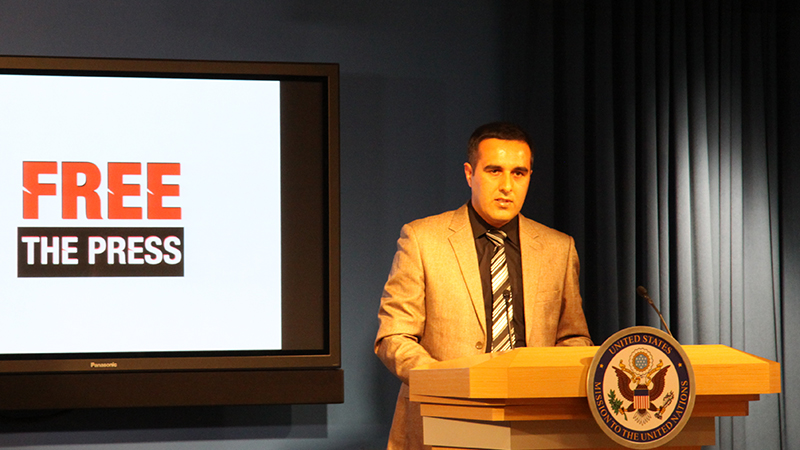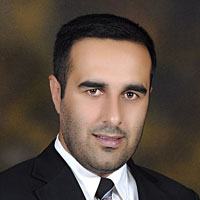
2014 Nieman Fellow Sangar Rahimi, a reporter for The New York Times in Afghanistan, spoke at the United States Mission to the United Nations for the launch of the State Department's third annual Free the Press event on April 25
Sangar Rahimi, a current Nieman Fellow and reporter for The New York Times in Afghanistan, addressed the US delegation to the United Nations in New York on April 25. Samantha Power, US ambassador to the UN, introduced him, during an event at which the US State Department launched its third annual Free the Press campaign. The campaign’s purpose, she said, is to “highlight both the perils faced by journalists and the vital importance of their work, and to do so in the days preceding World Press Freedom Day, which falls on May the third.” Assistant Secretary of State Tom Malinowski and Joel Simon of the Committee to Protect Journalists also addressed the delegation.
An Afghan journalist based in Kabul since 2007, Rahimi laid out the risks facing journalists in his country and the unprecedented toll of violence on their ranks. Edited excerpts of his speech:
2014 has proved to be the deadliest year for journalists in Afghanistan since the involvement of the international community began in 2001. The year started with the tragic loss of five journalists in the first four months in different parts of the country.
Noor Ahmad Noori, an Afghan journalist in restive Helmand province in southern Afghanistan, was abducted by unknown gunmen in mid-morning on January 24 from Lashkar Gah, the provincial capital, and his body was found by police on the side of the road wrapped in a sack that evening. Mr. Noori, a former stringer for The New York Times in Helmand, was hosting an Islamic education program for a local-radio broadcaster in the province.
His murder was followed on January 26 by the death of a second Afghan journalist— Mohammad Shahed Naeemi who was working for Saba, a local radio and TV channel in Kabul—in a suicide bomb attack that killed four others.
Nils Horner, a Swedish-British national and a longtime journalist for Swedish radio, was shot dead in broad daylight in the embassy district of Kabul on March 11.
Ahmad Sardar, 40, an Afghan journalist with Agence France-Presse and a very dear friend of mine, was shot at point-blank range in the Kabul Serena Hotel on March 21st alongside his wife, and two of his three children, ages 4 and 6 years old. His third child, 2-year-old Abuzar, survived after being shot several times.
Mr. Sardar was celebrating the Afghan New Year with his family when four terrorist Taliban managed to make their way into the hotel and open fire on diners with small hand pistols they had hidden in their shoes.
The last fatality in the first quarter of this year was Anja Niedringhaus, a veteran Pulitzer Prize-winning German photographer for Associated Press. She was shot dead by an Afghan police officer in the southeastern province of Khost a day before the April 5 presidential election in Afghanistan. She was covering preparations for the election with longtime Associated Press foreign correspondent Kathy Gannon, who was injured in the attack.
A decade earlier when a new chapter opened in the history of Afghanistan, Afghans were extremely thirsty for news and information. They were tired of the traditional state-run media and the sole Taliban government voice of the Sharia radio channel broadcasting mainly fear and intimidation.
There was a sudden boom in the number of the media outlets—print, visual and audio—in the country when the newly established government in Afghanistan adopted a policy of freedom of speech. The policy was supported by the international community. Right now there are 75 TV channels, more than 200 private radio stations, and hundreds of news websites and daily, weekly and monthly journals in the country. The opening up of the media landscape can be counted as one of the major achievements of the government of Afghanistan and of the international community.
Afghan journalists have made a tremendous amount of progress and have had many successes in the past couple of years covering major events in Afghanistan such as three presidential and two parliamentary elections, the first fraud-related banking scandal in the country, as well as several international conferences held in Kabul and many other important events.
But there have been setbacks and failures, too. The Afghan government and both chambers of the Afghan National Assembly have yet to approve the long-awaited mass communication law that has been held up for several years and subject to many amendments and changes by Afghan officials who still tend to view freedom of speech as a threat to their interests.
Security threats, killings, injuries, kidnapping, intimidation, physical and verbal harassment while reporting, lack of access to information, amateur journalism and a lack of professional knowledge, a lack of political will and the failure of Afghan security and judicial authorities to pursue the perpetrators of acts of violence against Afghan and international journalists are major challenges threatening the corps of journalists in Afghanistan. These problems also have made investigative journalism, which we desperately need in Afghanistan, almost impossible to carry out.
Afghan journalists are working under increasing pressure and in a strangulated atmosphere exerted on them by the Taliban, local power brokers, and narcotic traffickers and occasionally by officials in the Afghan government. We—in particular those of us who work with Western media outlets—are routinely smeared by the Taliban and other armed opposition to the Western-backed Afghan government as traitors or spies. Many Afghan journalists have been targeted, kidnapped or intimidated by various parties in the Afghan conflict just because of our affiliation with Western media.
Outside Kabul’s fragile security cordon, in the provinces where the Taliban, criminals, warlords and drug smugglers have freedom and impunity, my colleagues continue to report on very important stories, too often at the cost of their lives, without any protection or support from the government.
I very much appreciate the courageous and selfless work and sacrifice that my colleagues are making while reporting stories concerning different kinds of violence, violations of women’s rights, corruption, widespread poverty and the complicated issues around development projects in the provinces.
I started working in the media with the hope of bringing change, strengthening democracy, promoting the principles of human rights, women’s rights, exposing corruption, and the misuse of government authority by government officials. My main hope was to help my people understand their rights and obligations as citizens, to monitor the performance of the government, and hold accountable the wrongdoers.
I’ve been trained in a newsroom with brilliant New York Times foreign correspondents. I’ve had the privilege to learn from their knowledge, professional expertise, and dedication while reporting and have had the support of The New York Times as a prestigious name in the world’s media landscape. But despite having all these privileges, I’ve often received serious threats from the Taliban, and a few times I have been subjected to interrogation and intimidation. In addition, at times the government has threatened to prosecute me for allegedly defaming senior officials.
Many times we had to withhold our names from the credit line of the story if the topic concerned the crimes of the Taliban, warlords or narcotics smugglers. Sometimes after a controversial story is published, we have to turn off our phones and go underground for a few days to avoid being targeted for reprisal.
As the US government and its Western allies draw down their military commitment in Afghanistan, we see that those efforts are put into doubt. The Afghan government is not strong enough to protect the achievements over the past decade of the free media in Afghanistan.
Afghan journalists, and in particular those journalists who are reporting from the provinces or who are working with Western media outlets, still need the firm support of the international community. We are still in the process of maturing as independent entities free of the influence of the government or other parties involved in the conflict in Afghanistan. We need the continuing strong and steadfast support of the Committee to Protect Journalists and other journalists’ rights protection agencies to continue to do our job.
Personally, for me, it would be almost impossible to work as a journalist in Afghanistan if I had to work under the pressure and conditions facing my fellow Afghan journalists.
We are all well aware of the fact that the Western journalists currently based in Afghanistan will eventually leave the country as the transition process continues and it is the responsibility of Afghan journalists to provide the world with quality news from Afghanistan.


